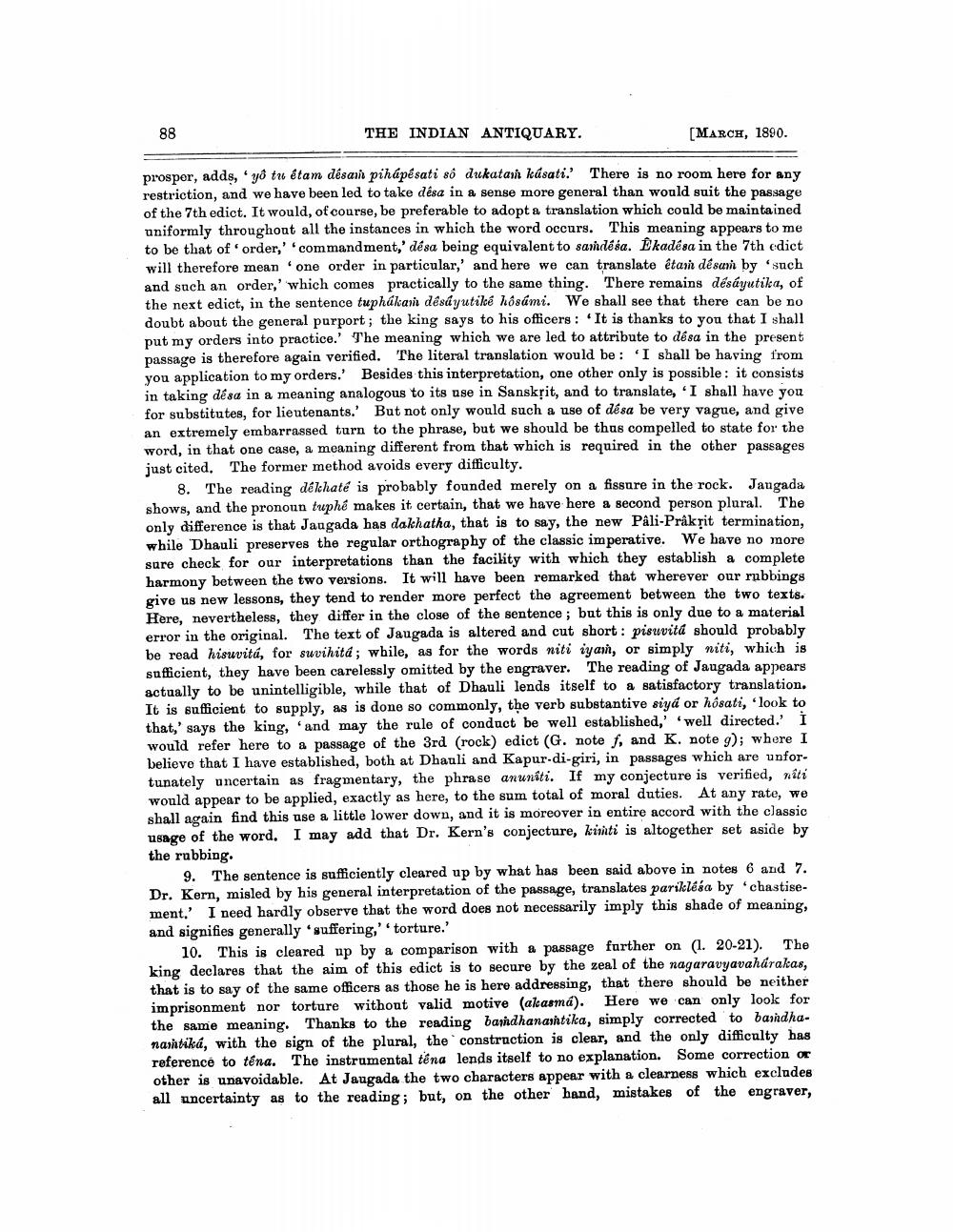________________
THE INDIAN ANTIQUARY.
[MARCH, 1890.
prosper, adds, yo tu étam désam pihápésati so dukatam kasati.' There is no room here for any restriction, and we have been led to take désa in a sense more general than would suit the passage of the 7th edict. It would, of course, be preferable to adopt a translation which could be maintained uniformly throughout all the instances in which the word occurs. This meaning appears to me to be that of order,' 'commandment,' désa being equivalent to samdésa. Ekadésa in the 7th edict will therefore mean one order in particular,' and here we can translate êtam désam by 'such and such an order,' which comes practically to the same thing. There remains désayutika, of the next edict, in the sentence tuphakam désayutiké hôsámi. We shall see that there can be no doubt about the general purport; the king says to his officers: 'It is thanks to you that I shall put my orders into practice.' The meaning which we are led to attribute to désa in the present passage is therefore again verified. The literal translation would be: 'I shall be having from you application to my orders.' Besides this interpretation, one other only is possible: it consists in taking desa in a meaning analogous to its use in Sanskrit, and to translate, I shall have you for substitutes, for lieutenants.' But not only would such a use of désa be very vague, and give an extremely embarrassed turn to the phrase, but we should be thus compelled to state for the word, in that one case, a meaning different from that which is required in the other passages just cited. The former method avoids every difficulty.
88
8. The reading dekhaté is probably founded merely on a fissure in the rock. Jaugada shows, and the pronoun tuphé makes it certain, that we have here a second person plural. The only difference is that Jaugada has dakhatha, that is to say, the new Pâli-Prâkrit termination, while Dhauli preserves the regular orthography of the classic imperative. We have no more sure check for our interpretations than the facility with which they establish a complete harmony between the two versions. It will have been remarked that wherever our rubbings give us new lessons, they tend to render more perfect the agreement between the two texts. Here, nevertheless, they differ in the close of the sentence; but this is only due to a material error in the original. The text of Jaugada is altered and cut short: pisuvita should probably be read hisuvitá, for suvihitá; while, as for the words niti iyam, or simply niti, which is sufficient, they have been carelessly omitted by the engraver. The reading of Jaugada appears actually to be unintelligible, while that of Dhauli lends itself to a satisfactory translation. It is sufficient to supply, as is done so commonly, the verb substantive siya or hôsati, 'look to that,' says the king, and may the rule of conduct be well established,' 'well directed.' İ would refer here to a passage of the 3rd (rock) edict (G. note f, and K. note g); where I believe that I have established, both at Dhauli and Kapur-di-giri, in passages which are unfortunately uncertain as fragmentary, the phrase anuniti. If my conjecture is verified, niti would appear to be applied, exactly as here, to the sum total of moral duties. At any rate, we shall again find this use a little lower down, and it is moreover in entire accord with the classic usage of the word. I may add that Dr. Kern's conjecture, kimti is altogether set aside by the rubbing.
9. The sentence is sufficiently cleared up by what has been said above in notes 6 and 7. Dr. Kern, misled by his general interpretation of the passage, translates pariklésa by 'chastisement.' I need hardly observe that the word does not necessarily imply this shade of meaning, and signifies generally suffering,' torture.'
10. This is cleared up by a comparison with a passage further on (1. 20-21). The king declares that the aim of this edict is to secure by the zeal of the nagaravyavahárakas, that is to say of the same officers as those he is here addressing, that there should be neither Here we can only look for imprisonment nor torture without valid motive (akasma). the same meaning. Thanks to the reading bandhanastika, simply corrected to bandhanastika, with the sign of the plural, the construction is clear, and the only difficulty has reference to tena. The instrumental tena lends itself to no explanation. Some correction or other is unavoidable. At Jaugada the two characters appear with a clearness which excludes all uncertainty as to the reading; but, on the other hand, mistakes of the engraver,




